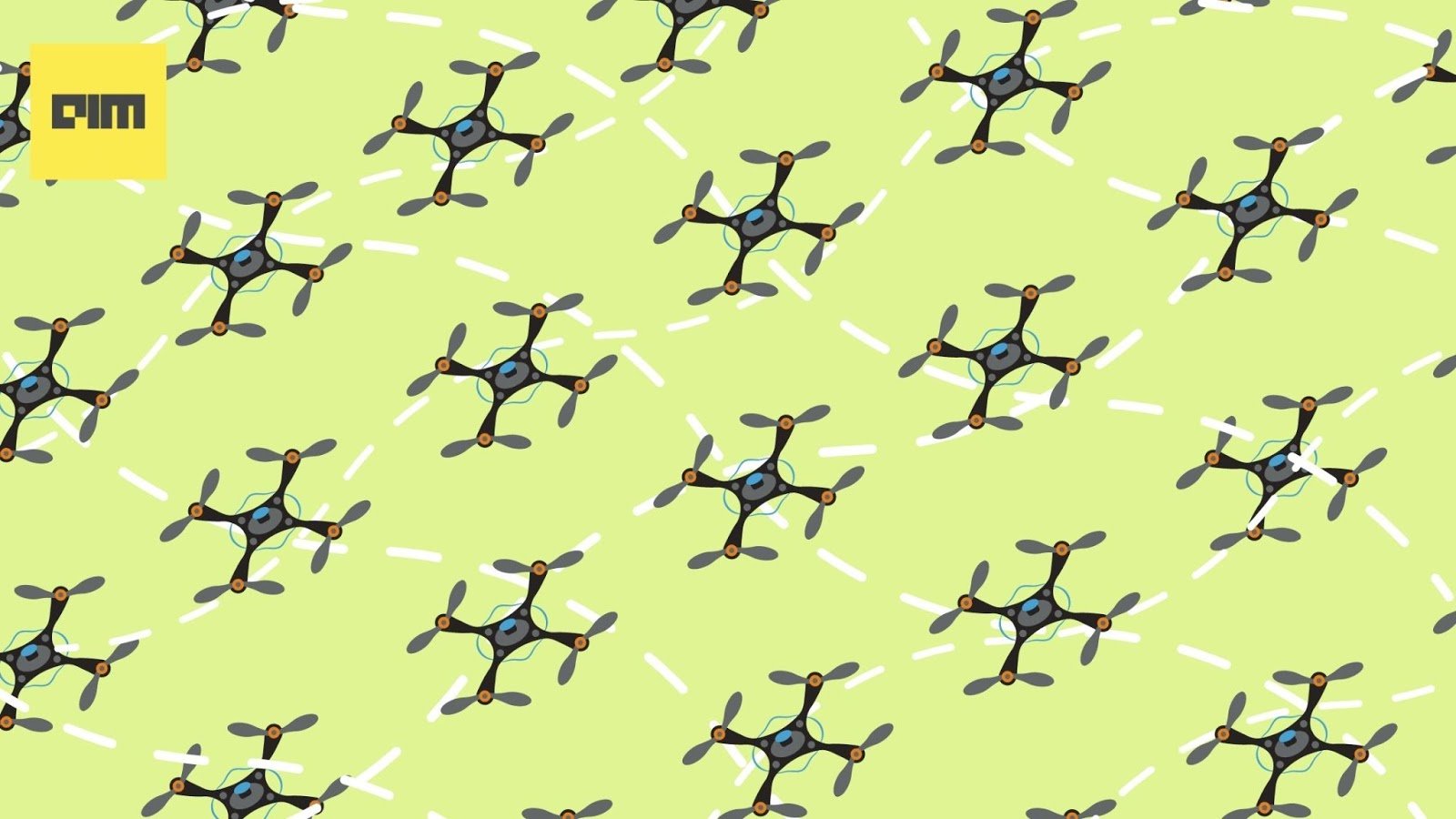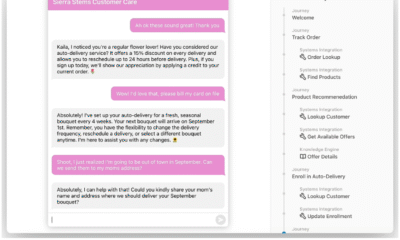Jobs & Careers
Drone Startup EndureAir Raises ₹25 Crore in Funding Led by IAN Alpha Fund

The funding will enhance its drone capabilities for defence applications, aid expansion into enterprise markets and further develop high-altitude logistics and aerial robotics platforms, the startup said in a press release.
Sarika Saxena, managing partner at IAN Alpha Fund, said, “EndureAir embodies the very
best of India’s deep-tech potential. By transforming cutting-edge research into powerful,
indigenous solutions, EndureAir is meeting critical needs in defence, enterprise and disaster
response.”
Founded in 2018 by Abhishek, a professor at IIT Kanpur, with his former students Rama Krishna and Ch
Jobs & Careers
OpenAI’s Nonprofit Arm to Take Over $100 Bn Equity Stake in its PBC

OpenAI announced in a blog post on September 11 that its nonprofit arm will now be ‘paired’ with an equity stake in its PBC (Public Benefit Corporation), which would exceed $100 billion.
The ChatGPT maker also said that it has reached a Memorandum of Understanding (MoU) with Microsoft for the conversion of its for-profit arm into a PBC. This structural shift was announced by OpenAI in May.
“This recapitalisation would also enable us to raise the capital required to accomplish our mission—and ensure that as OpenAI’s PBC grows, so will the nonprofit’s resources, allowing us to bring it to historic levels of community impact,” said the company in the announcement.
OpenAI was founded as a nonprofit organisation, and in 2019, it introduced a for-profit limited liability company (LLC) under nonprofit control to raise investments with capped profits.
“Our PBC charter and governance will establish that safety decisions must always be guided by this mission. We continue to work with the California and Delaware Attorneys General as an important part of strengthening our approach, and we remain committed to learning and acting with urgency to ensure our tools are helpful and safe for everyone, while advancing safety as an industry-wide priority,” added OpenAI.
Besides, the MoU marks the next phase of the relationship between Microsoft and OpenAI.
Microsoft has been a major backer of OpenAI over the past few years and has invested over $13 billion since 2019.
Initially, the deal granted Microsoft exclusive rights to power OpenAI’s tools through its cloud platform Azure, but these restrictions have relaxed over the past few months.
Instead, Microsoft now holds a right of first refusal (ROFR), meaning OpenAI must offer the company a chance to provide additional capacity first, but can turn to other providers if declined.
OpenAI has since engaged in various data centre projects, including its own (Project Stargate) and partnerships with companies such as Oracle and Google.
However, even as OpenAI has expanded its investor base, Microsoft remains OpenAI’s most significant external shareholder. Moreover, OpenAI’s API is exclusive to Microsoft’s Azure.
However, reports indicate rising tensions between the two companies, mainly due to a clause regarding Artificial General Intelligence (AGI) in their agreement. It states that if OpenAI achieves AGI, Microsoft would lose access to OpenAI’s advanced technologies.
Initially, this was meant to prevent a monopoly and keep control with OpenAI’s nonprofit board. However, Microsoft sees ongoing access as vital for its business, especially to compete with rivals like Google.
The post OpenAI’s Nonprofit Arm to Take Over $100 Bn Equity Stake in its PBC appeared first on Analytics India Magazine.
Jobs & Careers
Mira Murati’s Thinking Machines Cracks the Code on LLM Nondeterminism

Large language models (LLMs) often behave unpredictably during inference, producing different outputs even when given the same prompt.
Thinking Machines, an AI company founded by former OpenAI CTO Mira Murati, says it has identified the root cause of this nondeterminism and developed a solution that could make inference reproducible and reliable.
In a blog post titled “Defeating Nondeterminism in LLM Inference”, the company explained that the problem goes beyond the well-known issue of floating-point arithmetic and GPU concurrency.
While rounding errors from parallel computations do play a role, Thinking Machines argues that the real culprit is the lack of batch invariance in widely used inference kernels.
Batch invariance means that a model’s output for a given prompt should remain identical regardless of the batch size or how requests are grouped together. In current systems, many operations—such as matrix multiplications, attention mechanisms, and normalisation—change their internal computation strategies depending on batch size.
This variation in reduction order introduces tiny numerical differences, which can cascade into divergent outputs over long generations.
To address this, the team built batch-invariant kernels for key operations, including RMSNorm, matmul, and attention. Testing on the Qwen-3-8B model, they found that under default settings, 1,000 runs of the same prompt at temperature 0 produced 80 unique completions. With the modified kernels, all 1,000 completions were identical, demonstrating full reproducibility.
The trade-off, however, is speed. The batch-invariant setup ran slower than default inference, though optimisations to the attention kernel helped reduce the gap. Still, Thinking Machines argues that the performance cost is a fair price for the gains in determinism, especially for use cases in research, safety, and debugging.
“Reproducibility is a bedrock of scientific progress. However, it’s remarkably difficult to get reproducible results out of large language models.” the blog noted, adding that eliminating nondeterminism could also reduce discrepancies between training and inference phases of LLM deployment.
By reframing nondeterminism as a batch invariance problem, the company hopes to influence the design of future inference engines, where determinism may become as critical as raw speed.
The post Mira Murati’s Thinking Machines Cracks the Code on LLM Nondeterminism appeared first on Analytics India Magazine.
Jobs & Careers
TCS Launches Chiplet-Based Engineering Services to Boost Semiconductor Innovation

Tata Consultancy Services (TCS) has launched its chiplet-based system engineering services to help semiconductor companies design next-generation chips. TCS aims to enable faster, more efficient and powerful processors at a time when demand for advanced semiconductors is rising.
The company said that the new services are designed to support chipmakers as the industry shifts from traditional chip design to chiplet-based systems.
“TCS Chiplet-based System Engineering services will help semiconductor enterprises accelerate chiplets tapeout, driving flexibility, scalability and faster time to market,” said V Rajanna, president for technology, software and services at TCS.
Why Chiplet-Based Design Matters
The semiconductor industry faces bottlenecks in scaling and making chiplet-based design a preferred approach. Smaller chips can be mixed and matched to meet varied needs, enabling faster product launches and cost reduction.
With demand driven by AI, cloud computing, smartphones, electric vehicles and connected devices, this shift comes at a critical time.
India’s semiconductor market, valued at $45–50 billion in 2024–2025, is projected to grow to $100–110 billion by 2030. Backed by the India Semiconductor Mission, the country is aiming to become a global hub for chip design and manufacturing.
TCS’s new services are expected to strengthen this momentum by giving companies access to chip-to-system engineering expertise.
TCS in the Semiconductor Industry
TCS has over 20 years of experience in the semiconductor sector and offers a portfolio of chip-to-system engineering services. Its offerings include design and verification of UCIe and HBM standards, as well as advanced package design such as 2.5D and 3D interposers. The company has also worked with a North American semiconductor firm to integrate chiplets into AI processors, reducing delivery timelines.
In February this year, the Indian IT giant also announced a collaboration with Salesforce to enhance the use of AI in the manufacturing and semiconductor sectors. As part of this partnership, TCS launched three key initiatives to improve sales and service efficiency. The Semiconductor Sales Accelerator was expected to help businesses increase sales by providing data-driven insights.
The post TCS Launches Chiplet-Based Engineering Services to Boost Semiconductor Innovation appeared first on Analytics India Magazine.
-

 Business2 weeks ago
Business2 weeks agoThe Guardian view on Trump and the Fed: independence is no substitute for accountability | Editorial
-
Tools & Platforms1 month ago
Building Trust in Military AI Starts with Opening the Black Box – War on the Rocks
-

 Ethics & Policy2 months ago
Ethics & Policy2 months agoSDAIA Supports Saudi Arabia’s Leadership in Shaping Global AI Ethics, Policy, and Research – وكالة الأنباء السعودية
-

 Events & Conferences4 months ago
Events & Conferences4 months agoJourney to 1000 models: Scaling Instagram’s recommendation system
-

 Jobs & Careers2 months ago
Jobs & Careers2 months agoMumbai-based Perplexity Alternative Has 60k+ Users Without Funding
-

 Podcasts & Talks2 months ago
Podcasts & Talks2 months agoHappy 4th of July! 🎆 Made with Veo 3 in Gemini
-

 Education2 months ago
Education2 months agoVEX Robotics launches AI-powered classroom robotics system
-

 Education2 months ago
Education2 months agoMacron says UK and France have duty to tackle illegal migration ‘with humanity, solidarity and firmness’ – UK politics live | Politics
-

 Funding & Business2 months ago
Funding & Business2 months agoKayak and Expedia race to build AI travel agents that turn social posts into itineraries
-

 Podcasts & Talks2 months ago
Podcasts & Talks2 months agoOpenAI 🤝 @teamganassi





















